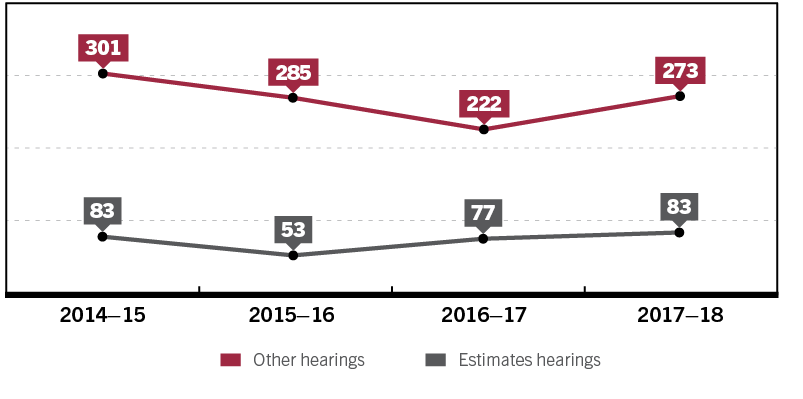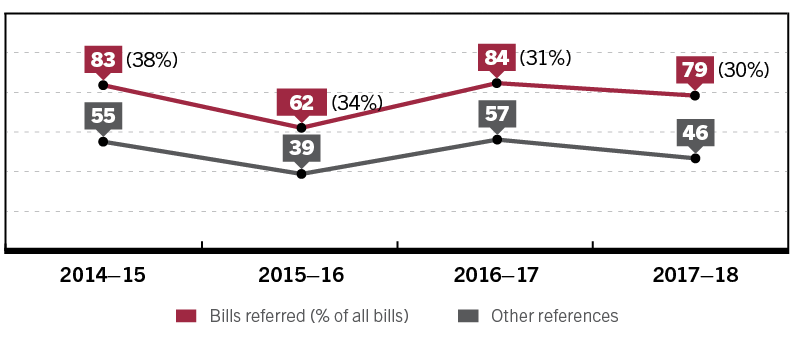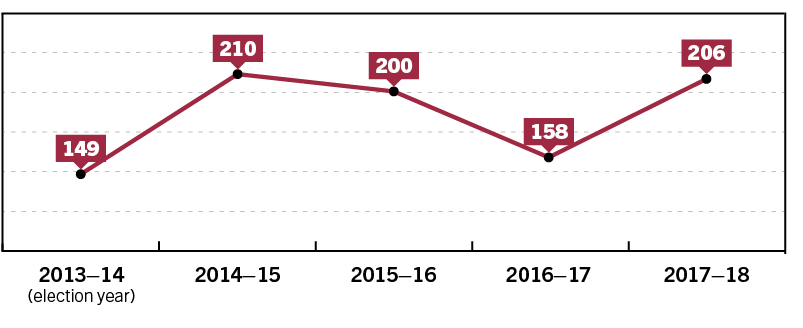| Outputs |
|
Secretariat support and procedural advice to the legislative and general purpose standing committees, select committees, and certain joint committees.
|
| The degree of satisfaction of the Chair of Committees, committee members and other senators with the quality and timeliness of advice and support. |
Formal and informal feedback, including reference to committee reports during debates in the Senate, shows that senators consider the support provided by the Committee Office to be effective. |
| Draft reports, reports and other documents are timely, accurate and of a high standard. Tabling deadlines are met. |
Accurate advice, documentation, and draft reports were provided to committees in accordance with their requirements.
Reports were drafted and presented to the Senate in accordance with the timeframes agreed by committees and deadlines set by the Senate.
|
| Inquiry information, evidence and reports are published promptly upon authorisation. |
Information was updated promptly and accurately on committee web pages. Submissions, other documents and reports were published consistent with the decisions of committees. |
| Inquiries from the public regarding committees are handled promptly and professionally. |
Telephone and email queries from the public were responded to promptly and accurately.
Members of the public had ready access to the material they requested regarding committee activities or procedures.
|
Overview
Committee Office secretariats supported the eight pairs of legislative and general purpose standing committees, 11 select committees, five joint committees and one joint select committee (see figure 9). During the year, committees continued to experience a significant workload, with high numbers of inquiries and hearings. The cost of the office in 2017–18 was $11.1m ($10.6m in 2016–17), with staff salaries comprising approximately 95 per cent of the office's total expenses.
The remaining costs continued to be administrative (for example, transport and accommodation for secretariat staff attending hearings, printing and venue hire). These administrative costs continue to be high due to the high numbers of interstate committee hearings.
Committee secretariats provided administrative support to committees, including processing submissions, publishing material to committee websites and arranging hearings around Australia. Staff also analysed the evidence committees received, drafted briefing material and reports, arranged for the tabling and publication of reports, and assisted witnesses and others to participate in inquiries. Finally, secretariats provided advice to chairs and committee members, including in relation to matters which raised complex procedural issues.
The significant workload of committees had a number of consequences for the support provided to them, including that they were at times required to prioritise inquiries and secretariats were not always able to provide assistance with the drafting of dissenting reports and additional comments. The pressure this workload placed upon senators resulted in the rescheduling of hearings at short notice, because of competing demands to attend multiple hearings, and the number of requested extensions to reporting timeframes.
Again, comments made in the Senate when committee reports are tabled or debated provide one means of evaluating the performance of the office. Several senators highlighted the contribution of committee staff when tabling such reports. Survey feedback from senators and unsolicited feedback from witnesses also continued to indicate high levels of satisfaction with the quality of the advice and support provided by secretariats.
Figure 9 – Elements and responsibilities of the Committee Office
| Executive |
|
Tim Bryant, Clerk Assistant
David Sullivan, Senior Clerk of Committees
|
|
Procedural advice and training.
Planning and coordination.
Secretariat staffing and resources.
Statistics and records.
|
Community Affairs
Jeanette Radcliffe
Economics
Mark Fitt
Education and Employment
Stephen Palethorpe
Environment and Communications
Christine McDonald
Finance and Public Administration
Ann Palmer
Foreign Affairs, Defence and Trade
Lyn Beverley
Legal and Constitutional Affairs
Tim Watling
Rural and Regional Affairs and Transport
Jane Thomson
Additional Support Unit
Sean Turner until 20 December 2017
Bonnie Allan from 8 January 2018
|
Australian Commission for Law Enforcement Integrity
Sophie Dunstone
Corporations and Financial Services
Patrick Hodder
Law Enforcement
Sophie Dunstone
National Broadband Network
Ann Palmer
National Disability Insurance Scheme
Gerry McInally
Oversight of the implementation of redress related recommendations of the Royal Commission into Institutional Responses to Child Sexual Abuse
Tim Watling
|
Charity Fundraising in the 21st Century
Bonnie Allan
Electric Vehicles
Ann Palmer
Funding for Research into Cancers with Low Survival Rates
Sophie Dunstone
Future of Public Interest Journalism
Tim Watling
Future of Work and Workers
Stephen Palethorpe
Lending to Primary Production Customers
Stephen Palethorpe
National Integrity Commission
Sophie Dunstone
Obesity Epidemic in Australia
Gerry McInally
Political Influence of Donations
Gerry McInally
Red Tape
Gerry McInally
Strengthening Multiculturalism
Gerry McInally
Stillbirth Research and Education
Sophie Dunstone
|
Activity levels and workload
The workload of the committees supported by the Committee Office is determined by decisions of the Senate and of the committees themselves. During this financial year, the Committee Office again faced a significant workload in terms of the number of committees and inquiries supported, although the level of committee activity stabilised a little below the extreme peaks of recent years. The highest number of inquiries managed at one time was 73 in August 2017.
Submissions, public hearings and witnesses
The continuing significant workload of committee secretariats during 2017–18 is evident in the administrative support provided to committees in relation to the processes committees use to collect evidence. This included processing 7,388 submissions (compared to 9,208 in 2016–17). This figure does not include the more than 30,000 emails and form letters linked to various campaigns, such as those directed against the proposed radioactive waste facility that was the subject of an inquiry by the Economics References Committee. In addition, secretariats arranged 356 public hearings (including 83 estimates hearings) at which 6,972 witnesses appeared (including 3,283 witnesses at estimates hearings). Secretariats also supported committees by arranging 696 private meetings and 16 site inspections.
Figure 10 – Number of committee hearings, 2014–15 to 2017–18

Again, to manage this volume of work the office continued to operate in a highly flexible manner with staff regularly working across committees in order to deal with peaks in workload.
Estimates hearings
Estimates hearings proceeded generally as scheduled in 2017–18 although a new public holiday during the Budget estimates rounds required minor rearrangements. The 83 hearings that were held in 2017–18 match the peak in 2014–15 after changes to standing orders were introduced to require additional hearings in specified circumstances.
References and reports
In addition to a considerable number of legislation inquiries, committees inquired into and reported on a diverse array of topics including cancers with a low survival rate, a commitment made by the Business Council of Australia to the Senate, trade and investment relationships with Africa, funding for the protection of the Great Barrier Reef and the science of mitochondrial donation.
Figure 11 – Number of references to committees, 2014–15 to 2017–181

The office supported committees in preparing and tabling a total of 206 reports. Figure 12 indicates clearly how the election cycle influences the workload of Senate committees. The two low points in the graph coincide with the beginning of a new Parliament.
Figure 12 – Reports presented by all committees supported by the Senate Committee Office 2013–14 to 2017–18

The quality of reports remains inherently difficult to measure as each report, while initially drafted by Committee Office staff is, in the end, a committee document which reflects the views of senators undertaking the inquiry. Nevertheless, feedback from senators and some participants in inquiries suggests that, despite the pressure created by the volume of reports, the high quality of committee reports continues to be maintained. This was achieved through the dedication and expertise of secretariat staff, on occasion supplemented by staff from other areas of the department providing research and drafting assistance.
Public information
The provision of information to the public about the work of Senate committees is an area of ongoing focus for the Committee Office.
The office continued to work with SPIO on projects to improve systems for writing reports and managing the high volume of answers to questions on notice provided to committees during estimates. Progress was also made on providing live updates about Senate estimates hearings. This will be fully implemented in 2018–19.
Committee Office staff also supported the department's seminar program by delivering training sessions to public servants and other members of the public about the operation of Senate committees.
International engagement
Committee Office staff acted as presenters for international delegations visiting Australia, and four secretaries and the Senior Clerk of Committees supported three parliamentary delegations, one parliamentary field visit and one committee visit to Portugal, Sweden, Canada, the Netherlands, the UK, Turkey, Greece, Brazil and Chile.
Management and leadership
Under standing order 25(10) a Chairs' Committee, comprising the chairs of standing committees and Senate select committees, may be convened by the Deputy President to discuss any matter relating to their operations. The Clerk Assistant (Committees) is the secretary. During 2017–18, this committee met to consider issues related to the procedural implications of video conferencing, levels of committee activity and satisfaction of senators with committee operations.
Committee secretaries also met regularly throughout the year to discuss administrative issues and procedural matters.
Performance outlook
The 2017–18 financial year again saw the Committee Office support a large number of inquiries. This level of activity is expected to decline slightly in 2018–19 because of a forthcoming federal election.
1 These figures refer to packages of bills referred to committees not to the number of individual bills referred.